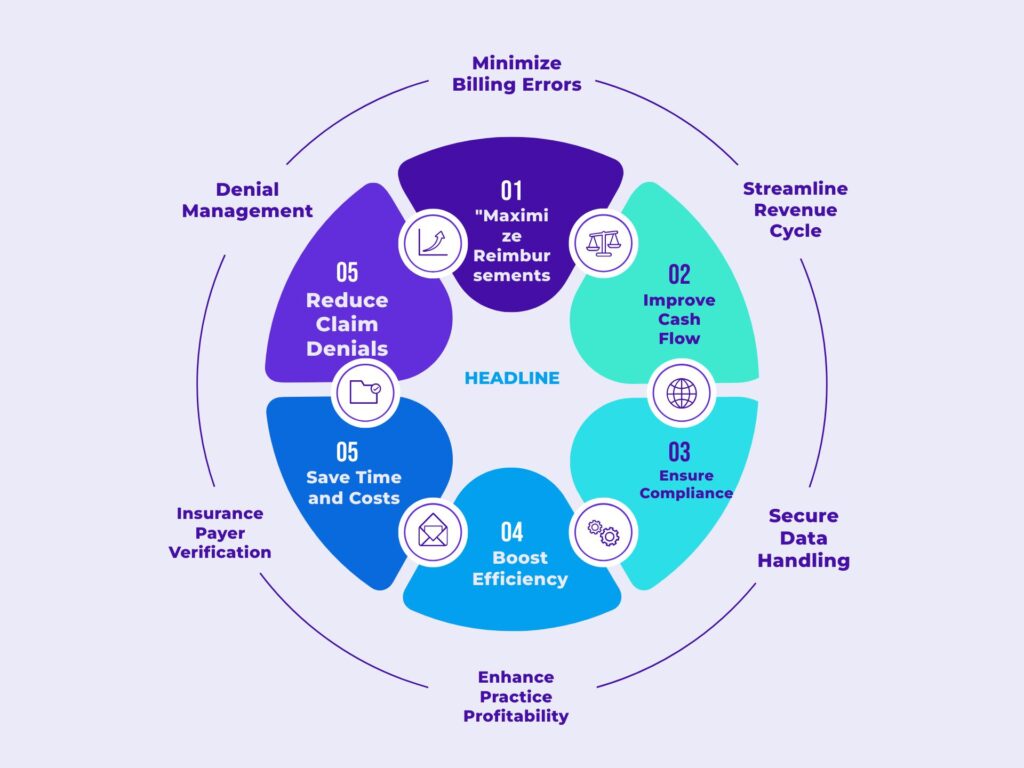Medical billing services are essential to the healthcare sector, facilitating efficient financial management and enabling healthcare professionals to concentrate on providing patient care. These services oversee the complex process of submitting claims, handling payments, and resolving denied claims. This article explores the importance of Physician Billing Services, highlights their advantages, and examines how they can streamline healthcare revenue cycles.
Physician Billing Services are understood.
Healthcare providers typically contract with physician billing services to oversee the administration of medical billing tasks. These services cover a variety of tasks, such as submitting claims, assigning medical codes, checking insurance coverage, collecting payments, and pursuing payments for claims that have been denied or remain unpaid. Physicians can reduce errors and improve their practice’s financial stability by handing over billing responsibilities to external parties.
Accurate billing is crucial in the healthcare sector.
Reliable financial record-keeping is crucial in the healthcare industry. Inaccuracies in billing can result in lost revenue, compliance problems, and patient discontent. Healthcare providers utilise physician billing services to guarantee exactness and adherence to ever-changing healthcare regulations. This reduction also frees up the administrative workload for medical staff, enabling them to concentrate on providing quality care.
Benefits of Outsourcing Physician Billing Services
Streamlined Operations
Medical practices can simplify their administrative tasks and concentrate on delivering primary patient care by outsourcing their billing operations.
Improved Revenue Generation
Professional billing services streamline the claim submission process, thereby reducing the number of denials and expediting payment receipt.
Improved Compliance
Maintaining compliance with constantly evolving healthcare regulations is particularly difficult. Physician Billing Services help ensure compliance with these standards, thereby decreasing the risk of legal issues.
Cost-Effective
Assembling an internal billing department can be costly. Hiring external specialists is available at a significantly lower cost. Availability of sophisticated technological systems.
Billing service providers utilize the most up-to-date technology and software to facilitate accurate and efficient billing procedures. The process of how Physician Billing Services operate.
The first step encompasses patient registration and insurance verification. The billing process initiates with gathering patient details and confirming insurance coverage in order to prevent claim rejections.
Coding Medical Data in a Clinical Setting
Experienced programmers translate healthcare services into universally accepted codes, thereby guaranteeing precise claim submissions.
Submission of Claim
The pre-submitted claims are processed electronically by insurance companies, thereby expediting the processing time.
Posting Payment Information.
Invoices from insurance companies and patient payments are promptly recorded in the practice’s financial ledgers.
Denial Management
Claims which have been denied are reprocessed, corrected, and re-submitted for reimbursement.
Why Physician Billing Services Are Essential for Medical Practices
Preparation of Reports and Data Analysis
Physicians are given comprehensive reports that contain information on revenue performance and potential areas for enhancement.Selecting an Appropriate Physician Billing Services Vendor
- When choosing a billing service provider, factor in the following key considerations.
- The combination of experience and knowledge.
- Verify that the service provider has relevant expertise in managing invoices for your specific medical specialty.
- The technology and equipment used.
- Seek out providers who utilize advanced software for tasks such as billing, coding, and reporting.
Transparent Pricing
Select a service provider with a transparent pricing structure to steer clear of unforeseen expenses.
Customer Support

Prompt and effective customer support is crucial for resolving problems and responding to customer inquiries in a timely manner.
Complexities in Medical Billing for Physician Billing Services
Effective handling of Physician Billing Processes is crucial to avoid significant financial repercussions for medical practices. A detailed examination of the typical challenges encountered within this field and their resulting consequences is presented below.
The intricacy of medical coding is a complex issue. Complexity of Medical Coding
The Challenge:
Medical billing largely depends on precise coding facilitated by systems such as the Current Procedural Terminology (CPT) and the International Classification of Diseases (ICD). Incorrect or incomplete coding of diagnoses and procedures can lead to denied claims or underpayment, even for minor discrepancies.
Implications:
- Monetary losses resulting from rejected policy claims.
- The administrative burden has risen due to corrections and resubmissions.
- Disruptions to cash flow caused by delayed payments.
The Difficulty Lies Here:
Expertise in medical coding is necessary due to the fact that codes are often revised with updates to standards and regulations. Introducing a revised version of ICD codes could bring about new coding options or adjustments to existing ones, potentially leading to discrepancies. Frequent fluctuations in healthcare legislation and policy. Frequent Changes in Healthcare Regulations
The Challenge:
The healthcare sector operates in a constantly changing regulatory framework. Regulations such as the Health Insurance Portability and Accountability Act (HIPAA), along with payer-specific guidelines, are regularly revised.
Implications:
- Disregarding regulations can result in fines and potential lawsuits.
- More effort and resources are needed to stay current.
- Introducing new regulations into established procedures can be quite complicated.
The Difficulty Lies in This:
Small practices often struggle to keep pace with these developments due to a lack of necessary expertise or resources. Maintaining compliance necessitates ongoing education, training, and the implementation of sophisticated systems.
Claims that are turned down or refused. Denied or Rejected Claims
Comparison of Key Features in Physician Billing Services
| Feature | Importance |
| Accuracy | Reduces claim denials |
| Technology | Enhances efficiency |
| Compliance | Mitigates legal risks |
| Cost-effectiveness | Saves operational expenses |
| Transparency | Builds trust with providers |
| Support Services | Ensures smooth operations |
The Challenge:
Many claims filed with insurance providers are either turned down or refused because of mistakes, missing details, or failure to meet specific requirements set by payers.
Implications:
- Consequences of delayed correction and resubmission of claims include revenue loss.
- Handling denied claims has led to higher operational costs.
- Staff members handling rework are experiencing decreased efficiency and lowered morale.
The Difficulty Lies in This:
The reasons for refusal of treatment requests can be quite diverse, ranging from discrepancies in patient information to incomplete medical records. Implementing solutions requires a proactive and structured strategy, which not all practices are capable of adopting.
Delayed Payments
The Challenge:
Ensuring revenue arrives on time is essential for the financial security of any healthcare organization. Delays in payment from insurance companies or patients are a frequent problem.
Implications:
- Disrupted cash flow is impacting operational expenditures and staff wages.
- Excessive administrative work is required for multiple follow-up actions.
- A sense of frustration is shared by both staff and patients.
The Difficulty Arises From:
Streamline Your Practice with Professional Physician Billing Services
Delays can be caused by several factors, such as inaccurate claim submissions, lengthy processing by insurance companies, or patients’ failure to make timely payments.
Handling Multiple Paying Parties Managing Multiple Payers
The Challenge:
Physician Billing Services entails navigating multiple insurance companies, each with distinct sets of regulations, specifications, and deadlines.
Implications:
- The complexity of tailoring claims to suit multiple payer requirements has increased.
- The presence of inconsistent procedures increases the likelihood of errors.
- Lengthy reconciliation and follow-up procedures.
The Difficulty Lies in This:
Managing the diverse policies and regulations for numerous insurance companies is a challenging task. Practices serving patients with diverse insurance coverage face even greater challenges.
Limited Availability of Resources and Specialized Knowledge. Inadequate Resources and Expertise. Lack of sufficient resources and specialized knowledge. Inadequate Resources and Expertise
The Challenge:
Small and mid-sized practices frequently struggle to access the resources and skilled staff needed to manage billing effectively.
Implications:
- Overreliance on exhausted employees is causing burnout and mistakes.
- Administrative duties have become a higher priority, resulting in a diminished focus on patient care.
- Inefficient billing processes result in lost potential revenue.
The difficulty lies in this. Smaller practices may struggle to compete with larger organizations due to the expense of setting up an in-house billing team or investing in sophisticated software. Overcoming Technological Obstacles and Ensuring Data Protection Technology Challenges and Data Security

The Challenge:
Implementing modern billing technology poses significant challenges, despite its importance in today’s billing processes. Security of sensitive patient information is a major priority.
Implications:
- Initial expenses for purchasing billing software are substantial.
- Data breaches pose risks of resulting in damage to one’s reputation and financial penalties.
- Technical problems and inadequate staff training are resulting in downtime and inefficiencies.
The Difficulty Lies in This Situation:
As cyberattacks become more common, healthcare providers need to invest in reliable security systems and ensure their systems are consistently updated to meet ongoing operational needs.
Patient Payment Dilemmas Patient Payment Challenges
The Challenge:
Another significant obstacle is the process of collecting payments directly from patients, especially for out-of-pocket expenses.
Implications:
- Losses due to unpaid or overdue payments from patients.
- The administrative hassle of sending reminders and follow-ups.
- Patient frustration and dissatisfaction arise when billing information is not clearly understood.
The Difficulty Lies in This:
Confusion surrounding medical bills can sometimes result in disagreements over costs or cause patients to make late payments. To tackle this problem, healthcare practices should commit to patient education and open communication.
Overcoming these obstacles with Physician Billing Services.
These challenges in Physician Billing Services are addressed by services specifically designed for this purpose. Efficient billing is guaranteed through the introduction of trained professionals, cutting-edge technologies, and well-established processes. Healthcare providers can alleviate errors and improve adherence to regulations by delegating billing duties, allowing them to concentrate on patient care and sidestep financial management intricacies.
Conclusion
Effective healthcare revenue cycles depend on the indispensable role of Physician Billing Services. Medical practices not only see financial improvements but also enable healthcare professionals to concentrate on their main objective: providing exceptional patient care. These services guarantee compliance, accuracy, and operational efficiency by utilizing technology, specialized knowledge, and optimized workflows. As the healthcare environment continues to change, medical billing systems will remain a fundamental component of efficient practice administration.
FAQs
How do Physician Billing Services ensure compliance with healthcare regulations?
Healthcare billing service providers remain informed about the most recent healthcare regulations, including HIPAA compliance and the specific requirements of each payer. Professional staff are employed to ensure that all claims are submitted in compliance with these regulations, thereby minimising the likelihood of legal or financial repercussions.
What is the difference between in-house billing and outsourced billing services?
In-house billing is typically handled by a practice’s staff using their own internal resources, involving considerable investment in training, technology, and personnel.
Billing services are outsourced to a specialized third-party company that handles billing efficiently, providing cost-effective options without the need for a large internal infrastructure.
What are the most common reasons for claim denials in Physician Billing Services?
Denial of claims can arise from:
- Patient information inaccuracies or incompleteness.
- Incorrect or incompatible medical coding.
- Failure to verify insurance coverage prior to rendering services.
- Lack of sufficient documentation hinders verification of the claims made.
- Physician billing services resolve these issues by ensuring accurate data entry, correct coding, and comprehensive documentation.
What steps can medical billing companies take to increase patient satisfaction?
Effective billing services minimize mistakes, provide clear visibility into patient charges, and simplify the payment process. This results in reduced patient frustration stemming from unanticipated charges or delayed reimbursement, ultimately producing a more streamlined experience and elevated satisfaction ratings.

